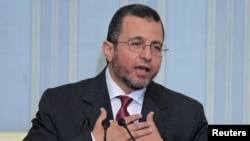CAIRO — Egypt's incoming Prime Minister Hisham Qandil announced the formation of his 35-member Cabinet Thursday. Veteran defense minister and head of Egypt's Supreme Council of the Armed Forces, Field Marshal Hussein Tantawi, will retain his post in the new government.
The announcement that Egypt finally has a new government came after days of behind-the-scenes bargaining and last-minute wrangling. The country's incoming Prime Minister Hisham Qandil urged his countrymen to work together.
Qandil said that Egypt's January 25th Revolution, which toppled former president Hosni Mubarak, succeeded because everyone worked together to achieve the same goal. Many of the goals of the revolution, he said, have not been achieved such as bread, freedom and social justice. Social justice, he stressed, requires hard work and cooperation.
Viewing the Cabinet line-up, critics in the Egyptian media complained that the new government contains few "big name" veterans with major experience. Analysts also noted that Egypt is facing a looming economic crisis, along with serious structural problems with electricity, food, fuel and water supplies.
Prime Minister Qandil also called on Egyptians to give his new government a chance.
Qandil added that it would nice to have a 100-day grace period for certain ministries to achieve short-term goals. Those goals, he noted, are designed to make citizens feel an improvement, rather than to find permanent solutions, which need more action, funding and time.
Many members of the new government are relative unknowns. A major exception, however, is veteran Defense Minister Mohamed Hussein Tantawi.
Field Marshal Tantawi has locked horns frequently with the country's newly-elected Islamist President Mohamed Morsi and limited his powers in a number of key areas. A latent conflict between those who want a secular political regime and the Muslim Brotherhood has created turmoil during Egypt's rocky transition to democracy.
Analyst Khattar Abou Diab, who teaches political science at the University of Paris, said that the new Egyptian government is a transitional government and that it remains to be seen which side ultimately triumphs.
Diab noted that the Muslim Brotherhood has not, for now, succeeded in gaining control over the most important factions of state, including the army, the foreign ministry, or the justice ministry. But, he argued, things could change since the new government is just a transition government, even if it could last a while.
Abou Diab also said that the new government is a major disappointment for the young people who sparked the revolution against the former regime, as well as for many secular political parties. Some, he said, worry that the Muslim Brotherhood will try to replace the old leadership with their own.
President Morsi had vowed to open up his government to women, minorities and rival political parties. But, analysts note that the new Cabinet contains only token representation for women and Christians.
The announcement that Egypt finally has a new government came after days of behind-the-scenes bargaining and last-minute wrangling. The country's incoming Prime Minister Hisham Qandil urged his countrymen to work together.
Qandil said that Egypt's January 25th Revolution, which toppled former president Hosni Mubarak, succeeded because everyone worked together to achieve the same goal. Many of the goals of the revolution, he said, have not been achieved such as bread, freedom and social justice. Social justice, he stressed, requires hard work and cooperation.
Viewing the Cabinet line-up, critics in the Egyptian media complained that the new government contains few "big name" veterans with major experience. Analysts also noted that Egypt is facing a looming economic crisis, along with serious structural problems with electricity, food, fuel and water supplies.
Prime Minister Qandil also called on Egyptians to give his new government a chance.
Qandil added that it would nice to have a 100-day grace period for certain ministries to achieve short-term goals. Those goals, he noted, are designed to make citizens feel an improvement, rather than to find permanent solutions, which need more action, funding and time.
Many members of the new government are relative unknowns. A major exception, however, is veteran Defense Minister Mohamed Hussein Tantawi.
Field Marshal Tantawi has locked horns frequently with the country's newly-elected Islamist President Mohamed Morsi and limited his powers in a number of key areas. A latent conflict between those who want a secular political regime and the Muslim Brotherhood has created turmoil during Egypt's rocky transition to democracy.
Analyst Khattar Abou Diab, who teaches political science at the University of Paris, said that the new Egyptian government is a transitional government and that it remains to be seen which side ultimately triumphs.
Diab noted that the Muslim Brotherhood has not, for now, succeeded in gaining control over the most important factions of state, including the army, the foreign ministry, or the justice ministry. But, he argued, things could change since the new government is just a transition government, even if it could last a while.
Abou Diab also said that the new government is a major disappointment for the young people who sparked the revolution against the former regime, as well as for many secular political parties. Some, he said, worry that the Muslim Brotherhood will try to replace the old leadership with their own.
President Morsi had vowed to open up his government to women, minorities and rival political parties. But, analysts note that the new Cabinet contains only token representation for women and Christians.
Loading timeline...




